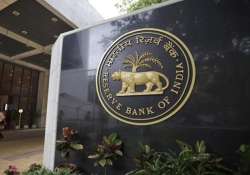RBI likely to cut interest rate by minimum quarter per cent point
At the new fiscal's first bi-monthly monetary policy review today, Reserve Bank of India (RBI) Governor Raghuram Rajan is widely expected to cut interest rates by at least a quarter of a percentage point on the back of the Union Budget's fiscal prude

Mumbai: At the new fiscal's first bi-monthly monetary policy review today, Reserve Bank of India (RBI) Governor Raghuram Rajan is widely expected to cut interest rates by at least a quarter of a percentage point on the back of the Union Budget's fiscal prudence measures, reduction in small savings interest rates and low inflation.
At its sixth and the fiscal's final bi-monthly monetary policy review in February, RBI kept its key lending rate unchanged at 6.75 percent.
The government has cut the small savings interest rate by up to 1.3 per cent, facilitating an RBI rate cut.
India's annual retail inflation eased to 5.18 per cent in February from 5.69 per cent in the month before even as the 12-month wholesale inflation was in the negative for the 16th straight month, official data showed last month.
Rajan, last month, kept the cards close to his chest on possible easing of monetary policy with rate cuts, but said the government's decision to stick to its fiscal targets was comforting. For the 2015-16 fiscal, the Finance Ministry last week said it had contained fiscal deficit at 3.9 per cent of the GDP and targets it at 3.5 per cent of the GDP during 2016-17.
The RBI Governor also said economic recovery in the country was not smooth, particularly after data on index of industrial production (IIP), released by the Central Statistics Office last month, showed India's factory output had logged a decline in January for the third straight month.
According to a CEO survey conducted by ASSOCHAM ahead of today’s monetary policy review, while 25 basis points cut in the interest rates by the RBI in the monetary policy is imminent, the real impact on lending costs will be felt if the apex bank goes for at least a 50 bps cut.
Yesterday, Finance Minister Arun Jaitley had pitched for easier monetary policy, arguing that high interest rates can make the economy sluggish. “The government has stuck to fiscal deficit commitments and inflation has been under control. Therefore, I do hope that this movement will continue in order to make our economy more competitive with more competitive interest rates,” he said.